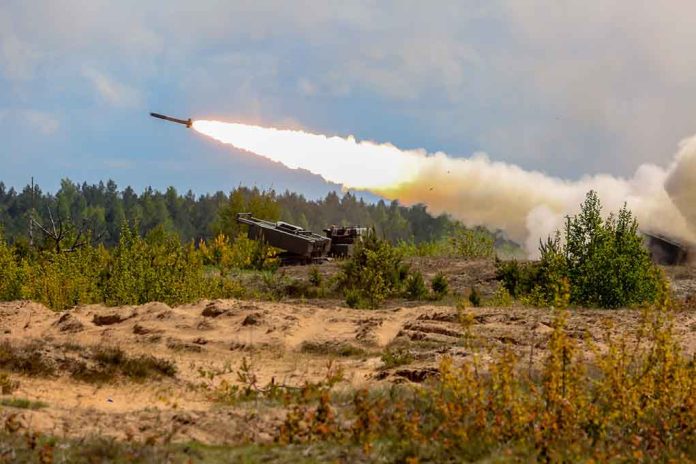
Russia threatens to strike Berlin directly if Germany delivers deadly Taurus missiles to Ukraine, as Chancellor Friedrich Merz announces plans to arm Ukraine with long-range weapons capable of hitting targets deep within Russian territory.
Key Takeaways
- German Chancellor Friedrich Merz announced the possibility of supplying Taurus cruise missiles to Ukraine with a range of 500 kilometers.
- Germany has pledged €5 billion in military support and plans to help Ukraine develop its own long-range missile capabilities.
- The Kremlin has issued explicit threats of retaliation against Berlin if German weapons are used to strike Russian cities.
- Western restrictions on using long-range missiles against targets within Russia have been eased, according to Merz, though this hasn’t been officially confirmed by Washington.
- Peace talks are scheduled for June 2 in Istanbul, but military escalations continue from both sides.
Germany’s Dangerous Escalation
German Chancellor Friedrich Merz has made a provocative declaration that delivering Taurus cruise missiles to Ukraine is “within the realm of possibility,” signaling a major shift in Germany’s military support. This announcement came after Merz met with Ukrainian President Volodymyr Zelenskyy in Berlin, where Germany committed to €5 billion in additional military aid. The Taurus missile system represents a significant upgrade to Ukraine’s strike capabilities with its impressive 500-kilometer range and sophisticated warhead design that could penetrate deep into Russian territory.
Merz specifically noted that deploying these advanced weapons would require “several months of training for soldiers in Ukraine.” This admission reveals the technical complexity of the systems and suggests Germany is prepared for a long-term commitment to Ukraine’s military development. The Taurus system is comparable to the Storm Shadow missiles already provided by Britain and France, but with potentially greater destructive capacity, representing a clear escalation of Western involvement in the conflict that Putin will surely view as crossing a red line.
Russia’s Fierce Response
The Kremlin has responded to Germany’s plans with unmistakable threats, warning of severe consequences if Taurus missiles are delivered to Ukraine. Russian state media has explicitly threatened that if German weapons are used to strike Russian cities, Moscow might retaliate directly against Berlin. This alarming escalation of rhetoric demonstrates Putin’s determination not to allow NATO countries to use Ukraine as a proxy for attacks on Russian soil without consequences. The threat of direct strikes on a NATO capital represents a dangerous new phase in the conflict.
“Ukraine will be able to fully defend itself, including against military targets outside its territory,” said Friedrich Merz, clearly indicating his intent to enable Ukraine to strike deep within Russia.
Russia has already been experiencing drone attacks from Ukraine that have reached Moscow and disrupted flights in the capital. The addition of long-range Taurus missiles would represent a substantial increase in Ukraine’s ability to threaten Russian cities and infrastructure. This development comes as Russia continues its offensive operations in Ukraine, suggesting Putin is unlikely to back down in the face of increased Western weapon supplies. The reciprocal escalations point toward an expanding conflict rather than resolution.
Changing Rules of Engagement
Merz made the controversial claim that Western allies have lifted previous restrictions on Ukraine’s use of long-range weapons against targets within Russia. According to the German Chancellor, this policy shift happened “many months ago.” However, this assertion has not been officially confirmed by Washington, raising questions about coordination among NATO allies. If true, this represents a major policy change that dramatically alters the nature of Western involvement in the conflict, effectively permitting Ukraine to use NATO-supplied weapons for strikes deep inside Russia.
“Of course, it is within the realms of possibility,” said Friedrich Merz, Chancellor of Germany, regarding the delivery of Taurus missiles to Ukraine.
Beyond simply providing weapons, Germany’s defense ministry has announced plans to finance the production of long-range weapons systems in Ukraine itself. “We want to talk about production and we will not publicly discuss details,” Merz stated, indicating a strategic shift toward building Ukraine’s domestic arms production capabilities. This approach represents a more sustainable form of military support that could give Ukraine independent strike capabilities for years to come, extending the conflict indefinitely while heightening tensions with Russia.
Diplomatic Tensions Amid Peace Talks
The timing of these announcements is particularly significant, coming just before peace talks scheduled for June 2 in Istanbul. Rather than creating conditions conducive to negotiation, these military escalations suggest Western powers are focused on strengthening Ukraine’s battlefield position ahead of talks. This approach risks undermining diplomatic efforts before they begin, as Russia is unlikely to make concessions while facing new threats from advanced Western weapons. President Trump has commented on Putin’s aggressive actions in Ukraine, recognizing the dangerous trajectory of the conflict.
Despite the planned peace negotiations, Germany’s actions demonstrate a commitment to military solutions rather than diplomatic ones. The €5 billion aid package, coupled with promises of advanced weapons systems, signals to Russia that Western powers are preparing for a long-term conflict. With both sides doubling down on military approaches, civilians in the conflict zone will continue to suffer while the risk of the war spreading beyond Ukraine’s borders increases substantially. The threatened direct retaliation against Berlin represents precisely this danger of wider European conflict.







